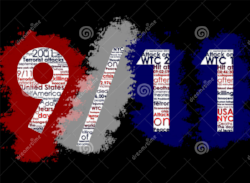September eleventh, sixteen years ago, was the first day I can recall where I could see and feel everything I thought about life shift. I was in tenth grade, in a civics class, when the first tower was hit and I watched the rest unfold live on CNN.
On Monday, I spoke with a group of students from Ferguson Middle about that day, and what they thought had changed about life in this country since. They honed in on security and, speaking from their life experiences in the last three years, the tendency of police to escalate existing tensions into violence.
The conversation continued like this: That terrible day exposed the racism and fear that already was present in our nation. Then, in the name of fighting terrorism at home, this newly unfettered racism fed suspicion and profiling of persons with brown and black skin, and doubly so persons with covered hair and long beards. Further influenced by real fear, some liberties were given over to the siren song of increased security. Therefore, guided to find terror at home and empowered to root it out of local schools and in our neighborhoods, we found what we were taught we ought to seek. And if this state of fear hasn't discovered much in the way of backyard terror training camps, it has - in the last decade and half - found targets in black young men with pockets of skittles or walking a few too many steps off the sidewalk and in protesters who raise questions about the state.
That's where the conversation ended for the kids - and many in our church community, workplaces and neighborhoods - because of the experience of being marked simply by the skin they walk around in and the neighborhoods their houses occupy.
At the time I write this, the city sits on edge, waiting for release of the Stockley verdict. No matter what the outcome is, activists of many stripes are preparing for action and the state is preparing a response.
Restoration, our theme in September, does not mean in this context a return to a Mayberry-esque unity under the banner of patriotism, but rather a renewal of the gospel call that God is for all of us. The kin-dom of God is a kin-dom grounded in God's inclusive love that excludes no one.
Inclusive love is grounded not in inaction but an active pursuit of a community where everyone, and especially those whose experiences inform a sense of marginalization, has a safe place to belong, grow and be loved. May restoration, a return to following the movement of Spirit, guide you this week into doing the work of enacting inclusive love, be that in voice in the streets or in a choir, painting rocks or other artistic means, in your home over a shared meal, and the myriad other ways you are being called to live out this gospel.

